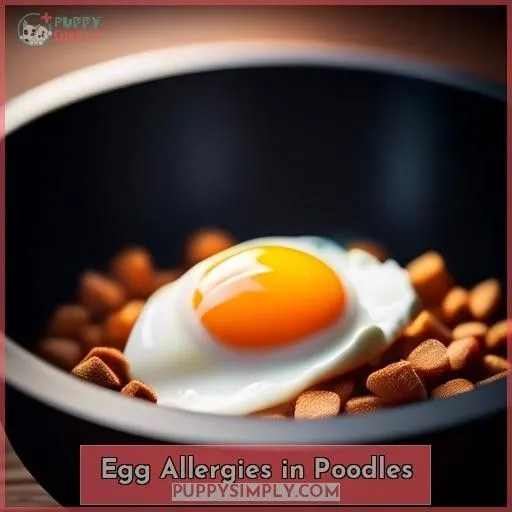This site is supported by our readers. We may earn a commission, at no cost to you, if you purchase through links.
 Poodles can eat eggs!
Poodles can eat eggs!
Eggs are a nourishing addition to your pup’s diet.
They are packed with high-quality protein, vitamins, and minerals.
Eggs promote healthy skin, coat, digestion, and immune function.
However, you must cook eggs thoroughly to eliminate risks like salmonella and biotin deficiency from raw whites.
Introduce eggs gradually and avoid seasonings.
Monitor for allergies.
Proper preparation and portion sizes suited to your poodle are essential.
If you’d like to learn more about safely incorporating this superfood into your furry friend’s meals, we’ll explore the details.
Table Of Contents
- Key Takeaways
- Can Poodles Eat Eggs?
- Can Poodles Eat Eggs?
- Nutritional Benefits of Eggs for Poodles
- Potential Health Benefits of Eggs for Poodles
- Risks of Feeding Raw Eggs to Poodles
- Safe Ways to Feed Eggs to Poodles
- What to Do if a Poodle Eats Raw Egg
- Egg Allergies in Poodles
- Proper Egg Preparation for Poodles
- Recommended Egg Feeding Frequency and Portion Size for Poodles
- Frequently Asked Questions (FAQs)
- Conclusion
Key Takeaways
- Eggs can be a beneficial addition to a poodle’s diet, providing high-quality protein, vitamins, and minerals that support healthy skin, coat, digestion, and immune function.
- It’s essential to cook eggs thoroughly to eliminate risks like salmonella and biotin deficiency from raw egg whites. Introduce eggs gradually and avoid seasonings. Monitor for allergies.
- Eggs can support skin and coat health in poodles, especially when dealing with gastrointestinal distress. They can also bolster the immune system and promote healthy skin and coat.
- Raw eggs can pose serious risks to poodles, including salmonella infection, biotin deficiency, and bacterial growth. Cooked eggs are a safer option, but it’s critical to monitor for allergies.
Can Poodles Eat Eggs?
Yes, poodles can eat eggs, but they should be cooked and served in moderation. Eggs are a good source of protein, healthy fats, vitamins, and minerals for dogs, but they shouldn’t exceed 10% of a dog’s daily calories to avoid obesity and other health issues.
Can Poodles Eat Eggs?
Absolutely, poodles can eat eggs! Egg consumption can be a beneficial addition to your poodle’s diet. However, it’s important to follow safety guidelines to safeguard your pup’s health. Here are some tips:
- Cook eggs thoroughly to eliminate bacterial infections.
- Avoid raw egg whites due to biotin deficiency risks.
- Monitor for allergies after introducing eggs.
- Limit eggshell consumption due to sharp edges and low nutritional value.
- One egg per day is recommended.
Nutritional Benefits of Eggs for Poodles
Eggs can be an excellent addition to your Poodle’s diet. The high protein content and rich array of vitamins and minerals in eggs can support your pup’s overall health and skin and coat condition.
High in Protein
Poodles can enjoy the nutritional benefits of eggs, which are high in protein. Eggs contain all nine essential amino acids, making them a complete protein source. The protein absorption in eggs is also high, making them an excellent addition to your pup’s daily protein intake.
Eggs provide more protein per gram than meat, and cooked eggs like hard-boiled or scrambled are safer options. Egg yolks are particularly rich in protein, and eggshells contribute to the protein content.
Rich in Vitamins and Minerals
Eggs are a nutritious enhancement to your Poodle’s diet, providing them with a variety of essential vitamins and minerals. The nutrient profile of eggs includes biotin, which is pivotal for maintaining healthy skin and coat, as well as vitamins A, D, and E, which support immune system function and overall health. Eggs are also rich in minerals like calcium, phosphorus, and selenium, which contribute to bone health and metabolic processes.
To guarantee the freshness and safety of eggs for your Poodle, follow these guidelines:
- Store eggs appropriately in their cartons in the coldest area of your refrigerator.
- Properly store raw eggs for three to five weeks from the time you bring them home, and after cooking, refrigerated hard-boiled eggs last safely for a week.
- Check for signs of spoilage before feeding your dog any leftover eggs.
When preparing eggs for your Poodle, consider the following:
- Cook eggs thoroughly to prevent bacterial infections.
- Avoid raw egg whites due to the risk of biotin deficiency.
- Monitor for allergies after feeding eggs.
- Limit eggshell consumption due to sharp edges and low nutritional value.
- One egg per day is recommended.
Remember to consult with a veterinarian for appropriate portion size, considering factors such as your Poodle’s size, age, activity level, and health issues.
Support Skin and Coat Health
Yes, eggs can support your Poodle’s skin and coat health. They’re rich in biotin, which helps prevent biotin deficiency and supports skin health. Eggs also provide digestive support, boosting your dog’s immune system. By incorporating eggs into your Poodle’s diet, you can enhance their skin and coat condition, ensuring they look and feel their best.
Potential Health Benefits of Eggs for Poodles
Eggs can provide a digestive boost for your Poodle, helping to soothe an upset stomach. Eggs are also rich in nutrients that support your Poodle’s immune system and promote healthy skin and coat.
Digestive Support
Eggs can provide digestive support for Poodles, especially when dealing with gastrointestinal distress. Egg yolks, rich in protein, can help soothe upset stomachs and ease digestive issues.
However, raw eggs carry the risk of salmonella infection, so it’s essential to cook eggs thoroughly before feeding them to your pup. Scrambled eggs are a safe option, but avoid adding oil, butter, salt, or seasonings.
Gradually introduce eggs to your Poodle’s diet, starting with one egg per week, to monitor for any adverse reactions.
Immune System Boost
Eggs can bolster your Poodle’s immune system. They harbor antioxidants, omega-3 fatty acids, and minerals like selenium, which sustain metabolism and joint function. Eggs also yield fatty acids that can assist in alleviating joint pain.
However, exercise vigilance with allergens, and ensure that the eggs are cooked appropriately to preclude bacterial proliferation.
Consult your veterinarian for the optimal quantity and regularity of eggs for your Poodle.
Improved Skin and Coat Condition
Eggs are a fantastic source of nutrients that can help improve your Poodle’s skin and coat health. The egg yolk is rich in omega-3 fatty acids, which help hydrate the skin and nourish the coat, providing relief for itchy skin.
By incorporating eggs into your Poodle’s diet, you can support their overall skin and coat condition. The omega-3 content also aids in skin hydration, making your Poodle’s fur look shiny and healthy.
Risks of Feeding Raw Eggs to Poodles
While eggs can be a nutritious treat for Poodles, feeding them raw eggs can pose serious risks. Uncooked eggs may contain harmful bacteria like Salmonella or lead to biotin deficiency, so it’s imperative to take precautions when incorporating eggs into your Poodle’s diet.
Salmonella Infection
Yes, Poodles can eat eggs, but it’s essential to avoid the dangers associated with raw eggs. Here are some tips for safe egg feeding:
- Cook eggs completely: Raw eggs carry the risk of Salmonella infection and bacterial growth. Cooking eggs deactivates avidin, eliminating the risk of biotin deficiency.
- Avoid raw egg whites: Raw egg whites contain avidin, which can bind biotin and cause deficiency.
- Watch for allergies: Introduce eggs gradually and monitor for digestive issues, sneezing, coughing, hives, skin rashes, ear infections, excessive drooling, wheezing, difficulty breathing, rapid or weak pulse, blue or pale gums, loss of consciousness, seizures.
- Consult a veterinarian: For appropriate portion size, considering factors such as size, age, activity level, and health issues.
Biotin Deficiency
Feeding raw eggs to your Poodle can lead to biotin deficiency. Raw egg whites contain avidin, an enzyme that binds biotin and prevents its absorption. A biotin deficiency can cause symptoms like dry and dull hair, skin lesions, and reduced growth rate.
Cooking eggs deactivates avidin, making it safe for your Poodle. Biotin is essential for enzyme activity, metabolism, and cancer prevention.
To avoid biotin deficiency, cook eggs before feeding them to your Poodle and avoid sharing seasoned breakfast eggs.
Bacterial Growth
Raw eggs can pose several risks to Poodles, including bacterial growth. The primary concern is Salmonella infection, which can lead to serious health issues in dogs.
Additionally, raw egg whites contain avidin, a biotin-binding protein that can cause biotin deficiency when consumed without the yolk. Cooking eggs deactivates avidin, making cooked eggs a safer option.
However, it’s critical to monitor for allergies after feeding eggs, as some Poodles may have an adverse reaction. Eggshell consumption should also be limited due to sharp edges and low nutritional value.
One egg per day is recommended, and it’s imperative to consult with a veterinarian for appropriate portion size based on factors like size, age, activity level, and health issues.
Safe Ways to Feed Eggs to Poodles
While poodles can benefit from the nutritional value of eggs, it’s vital to feed them cooked eggs without any seasonings or additives. Introduce eggs gradually into your poodle’s diet to monitor for any potential allergic reactions or digestive issues.
Cooked Eggs
Cooked eggs are safe for Poodles and can provide numerous health benefits. Here are some safe ways to feed cooked eggs to your Poodle:
- Egg Proteins: Cooked egg proteins are easily digestible and can support your Poodle’s overall health.
- Egg Yolk Nutrients: Egg yolks are rich in vitamins and minerals, such as iron, fatty acids, folate, and selenium, which can support your Poodle’s skin and coat health.
- Egg Shell Risks: While eggshells contain calcium, they can pose a choking hazard and have sharp edges that may cause injury.
- Egg Allergy Symptoms: Monitor your Poodle for any signs of egg allergy, such as digestive issues, sneezing, coughing, hives, skin rashes, ear infections, or excessive drooling.
Avoiding Seasonings and Additives
Just as you wouldn’t pile on the salt and pepper when cooking for a child, keep your poodle’s eggs plain.
Egg yolk nutrients and egg protein benefits shine without the frills.
Omega-3 fatty acids and vitamin A pack a punch in every bite.
So, skip the seasoning and let these natural goodies bolster your furry friend’s health, sans the unnecessary extras.
Introducing Eggs Gradually
When adding eggs to your Poodle’s diet, it’s imperative to follow a gradual process to prevent digestive issues and potential allergic reactions.
Begin with a small portion, such as one-quarter of an egg, and observe your Poodle’s reaction over the next 24 hours.
If there are no negative effects, gradually increase the amount to a half egg and continue monitoring.
After a few days, you can introduce a whole egg.
Track your Poodle’s digestive health and any indications of allergic reactions, such as vomiting, diarrhea, or skin irritation.
If any problems arise, consult your veterinarian for advice.
What to Do if a Poodle Eats Raw Egg
If your poodle accidentally ingests a raw egg, it’s essential to observe for any indications of salmonellosis, such as vomiting, diarrhea, fever, or lethargy. Seek immediate medical attention from your veterinarian, especially if your pup exhibits these symptoms, as they may suggest appropriate treatment or examinations to safeguard your poodle’s well-being.
Monitor for Salmonellosis Symptoms
If your Poodle eats a raw egg, monitor them closely for signs of salmonellosis, such as loss of appetite, fever, diarrhea, and vomiting. If symptoms appear, consult a veterinarian for a checkup. Home treatment may include rehydration and dietary changes.
Consult a Veterinarian
If your Poodle has ingested raw eggs, it’s imperative to seek veterinary attention. Raw eggs can potentially cause adverse effects such as salmonella contamination, biotin inadequacy, bacterial proliferation, and allergic reactions. Your veterinarian can evaluate the situation and offer advice on monitoring your pet for any manifestations or requisite treatments.
Egg Allergies in Poodles
While eggs are generally safe for poodles, you should watch for signs of an egg allergy. Common symptoms include digestive issues, skin irritation, sneezing, and coughing. In severe cases, an egg allergy can cause anaphylaxis—rapid breathing, swelling, pale gums, and loss of consciousness—requiring immediate veterinary attention.
Symptoms of Egg Allergy
If your Poodle is allergic to eggs, watch for symptoms like digestive issues, sneezing, coughing, hives, skin rashes, ear infections, and excessive drooling. Severe reactions may include wheezing, difficulty breathing, rapid or weak pulse, blue or pale gums, loss of consciousness, seizures, or anaphylaxis. Always consult a vet if you suspect an egg allergy.
Severe Allergic Reactions
If your Poodle has an egg allergy, it’s imperative to keep an eye out for severe allergic reactions. Anaphylactic shock is a rare but potential outcome when the reaction to the allergen is overwhelming. Symptoms of anaphylactic shock include difficulty breathing, rapid or weak pulse, blue or pale gums, loss of consciousness, and seizures. In such cases, prompt veterinary care is essential.
Treatment for an egg allergy in dogs typically involves a special diet that excludes eggs from their diet. Your veterinarian may also suggest certain medications to help alleviate symptoms. With appropriate care and treatment, most dogs with an egg allergy can live happy and healthy lives.
Proper Egg Preparation for Poodles
You should prepare eggs for your poodle in safe ways, like hardboiling or scrambling them without oil, butter, or seasonings. Fried eggs with added fats and flavorings can upset your pup’s stomach and provide unnecessary calories, so it’s best to avoid those preparations.
Hardboiled Eggs
Hardboiled eggs are a great option for Poodles, as they’re easy to digest and packed with protein and nutrients.
The eggshells provide calcium benefits, while the yolk offers essential nutrients like vitamin A and omega-3 fatty acids.
Store hardboiled eggs in the fridge to prevent bacterial growth.
Be cautious of egg white allergies.
Scrambled Eggs
When whipping up scrambled eggs for your poodle, think simple. Skip the breakfast egg seasoning—your pup’s palate won’t miss it. Remember, egg white avidin can be a no-no, but cooking neutralizes it, boosting boiled egg digestibility. Keep an eye out for egg allergy symptoms, though; it’s rare, but better safe than scratching!
Avoiding Fried Eggs With Oil or Butter
Poodles can consume eggs, but it’s critical to avoid fried eggs with oil or butter. Here’s the reason:
- Mitigate Allergy Risk: Fried eggs with oil or butter can heighten the risk of an egg allergy in your Poodle.
- Bacterial Growth: Oil and butter can create a haven for bacteria, which can lead to digestive problems.
- Biotin Deficiency: Raw egg whites contain avidin, which can bind biotin and cause deficiency. Cooking eggs deactivates avidin, eliminating the risk.
- Shell Ingestion: Eggshells can cause digestive issues, especially if your Poodle consumes them often.
- Digestive Problems: Fried eggs with oil or butter can lead to digestive problems, such as diarrhea or vomiting.
To safeguard the well-being of your Poodle, adhere to plain, cooked eggs without oil, butter, salt, or seasoning.
Recommended Egg Feeding Frequency and Portion Size for Poodles
When introducing eggs into your poodle’s diet, it’s essential to consult with your veterinarian. This will determine the appropriate frequency and portion size, taking into account factors like age, size, activity level, and any underlying health conditions.
A general guideline is to feed eggs a few times per week as a treat. Keep the portion within 10% of your poodle’s daily caloric intake.
Consultation With a Veterinarian
Consulting a veterinarian is essential when considering egg feeding frequency and portion size for your Poodle.
They can provide tailored recommendations based on your dog’s health, size, age, activity level, and any underlying health issues.
Always store eggs securely and cook them thoroughly to avert bacterial infections.
If your dog encounters allergic reactions, such as digestive issues or skin rashes, consult your veterinarian.
Considering Individual Factors
When pondering the suggested egg feeding frequency and portion size for your Poodle, it’s crucial to take into account their size, age, activity level, and overall well-being. Poodles come in various sizes, from Toy to Standard, and their dietary requirements may vary. For instance, smaller Poodles like Toy and Miniature Poodles may benefit from 2 or even 3 meals per day, while larger Poodles may do well with 2 or 3 meals per day, depending on their activity level and individual metabolism.
Eggs can be a nourishing addition to your Poodle’s diet, providing protein, essential fatty acids, vitamins, and minerals that support overall health, skin, and coat. However, they should be given in moderation as an occasional treat, not as a daily staple. A general guideline is to feed one egg per day, but this can vary depending on your Poodle’s size and activity level.
When introducing eggs to your Poodle’s diet, start with a small portion and monitor their digestive system for any adverse reactions. If you notice any issues, consult your veterinarian for advice on appropriate portion sizes and feeding frequency.
Frequently Asked Questions (FAQs)
What are the common signs of egg allergy in poodles?
You’ll want to watch for digestive issues like vomiting or diarrhea, skin rashes, excessive itching or scratching, and respiratory symptoms if your poodle has an egg allergy. It’s best to get your vet’s advice before introducing eggs.
Can poodles eat raw eggshells?
Nope, you shouldn’t feed your poodle raw eggshells. They’re sharp and can lacerate their mouth or digestive tract. Stick to cooked eggs—scrambled or boiled work best for your furry pal’s safety.
What are the recommended feeding frequencies for poodles?
Listen up, 15% of poodles are sensitive to eggs’ proteins. You should feed eggs 2-3 times weekly max, no more than one per serving. Too many can lead to weight gain and digestive issues for your furry pal. Moderation is key, even for healthy treats.
How can I prepare eggs for my poodle?
You can hard-boil, scramble (without butter/oil), or serve as a plain omelet for your poodle’s tasty, protein-packed treat. Just avoid raw eggs or added seasonings that could upset their tummy.
What are the risks of feeding scrambled eggs to poodles?
Feeding scrambled eggs risks an upset stomach or allergic reaction if your poodle’s sensitive. Start with a tiny bit – monitor closely for signs of distress like vomiting or diarrhea. Moderation’s key; too many eggs can lead to obesity or nutritional imbalances.
Conclusion
Joking aside, incorporating eggs into your poodle’s diet can be a nutritious choice, provided you follow the proper safety guidelines.
Thoroughly cook the eggs to mitigate health risks.
Introduce them gradually.
Monitor for allergies.
When prepared correctly and fed in appropriate portions, eggs can promote healthy skin, coats, digestion, and immune function in poodles.
Consult your veterinarian to ensure you’re meeting your furry friend’s unique dietary needs with this protein-packed superfood.














